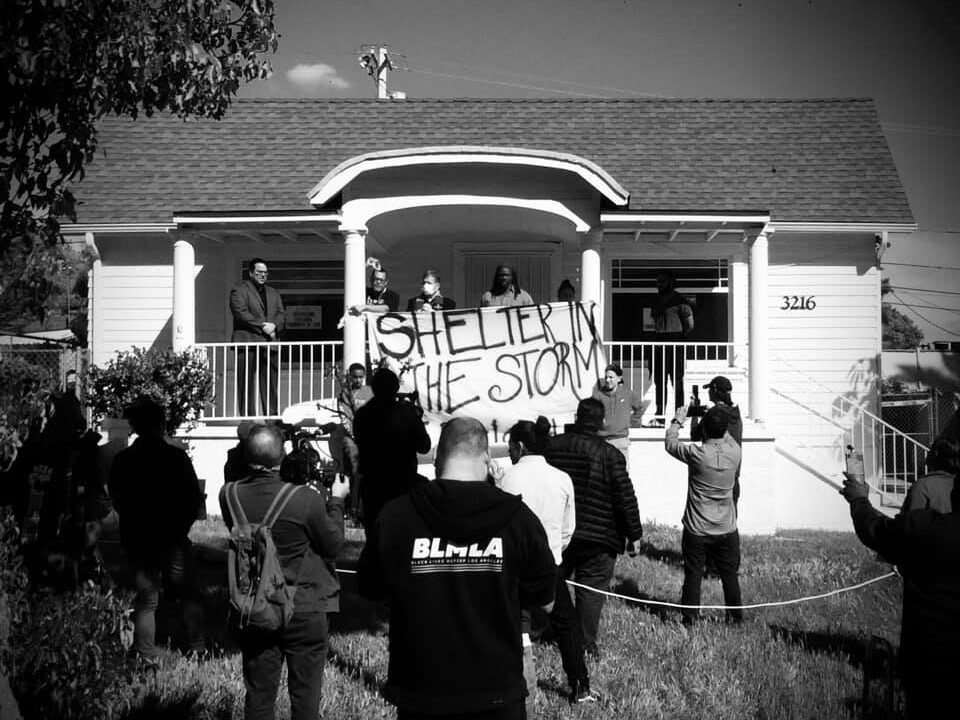Home. It’s where we feel safe; where we raise and protect our families. That has never been more clear than at this moment, as we confront the spread of coronavirus, one of the biggest health crises in a generation. Yet, the alarming reality is for tens of millions of Americans decent, safe, affordable housing is an urgent, unmet need. Housing costs have spiraled out of control for working families in urban and suburban settings alike, particularly in communities of color that companies have long targeted with predatory housing schemes. And COVID 19 is illustrating just how insecure all of our housing is, while demands and actions to stop evictions and foreclosure demonstrate what the government can do with sufficient pressure.
While the housing crisis has been building for decades, since the Great Recession, gentrification, rising rents, and the corporatization of rental properties—both multifamily and single-family homes— have rapidly increased the displacement of people of color to far-flung communities, or in far too many cases, into the streets.
In the 2000s, corporate landlords – large-scale, investor-driven companies that own thousands of homes – weren’t players in single family rentals. But from 2007 to 2011, almost 6 million homes were foreclosed or lost to short sale. Private-equity firms created new ways to finance purchasing them in bulk, and the practice proved so lucrative that today there are between 25 and 30 corporate landlords active in the single family space.
This exploitative speculation has extended to manufactured housing, or what most of us would refer to as trailer parks. In the mid-2010s, investors realized they could turn a quick profit by purchasing the companies that owned the land under trailers and quickly raise the rent charged for the “lot” – the space where people park their home. Some of the richest private equity firms, including Blackstone, with $150 billion in assets, have already bought up tens of thousands of home lots.
These players have long been present in what the industry refers to as “multi-family housing” – basically, apartments and condos. The National Multifamily Housing Council’s Top 50 from 2019 collectively control the rents of millions of apartments located in every state across the country. These companies are owned by some of the richest people in the world, like billionaires Warren Buffett of Berkshire Hathaway and Barry Sternlicht of Starwood Capital.
These corporate landlords have been at the center of turning our homes into profit engines for the megarich. While the coronavirus health crisis further illustrates how central an affordable home is for not only our families but our collective health, we are left at the mercy of these companies. They have the power to freeze mortgage and rent payments, or continue their history of disaster capitalism and grow their bank accounts while we lose our homes.
Another reality is possible. There are growing common good demands from local unions, tenants rights and housing justice organizations across the country to suspend evictions, mortgage and rent payments, and utility shut-offs. These calls build on the growing body of common good work in housing.
In July of last year, over 200 leaders from housing justice and community organizing groups, worker centers, local and national labor unions gathered in Chicago, IL for Bargaining for the Common Good (BCG)’s Housing Justice Convening. Collectively, these organizations represent millions of workers and community members around the country. They came together to share information on the rise and role of corporate landlords in their cities and states, increase their collective understanding of the tactics those landlords use to extract wealth from community members, and align around the necessity of strong labor and community partnerships to confront the housing crisis. At the meeting, Chicago Teachers’ Union (CTU) staff and membership led a workshop around the work they are doing on housing, their contract negotiations, and how important and central affordable housing and homelessness is for their membership, students, and community.
A few months later, CTU and SEIU 73 were on strike, with housing as a central demand. They described how over 18,000 students were homeless and highlighted the billions in tax subsidies that local real estate developments had received. Thousands of teachers, students, parents and community members were in the streets demanding affordable homes as a key part of the Chicago they deserve. They didn’t just have allies in Chicago. Community Voices Heard (CVH), a member-led, multi-racial housing organization that organizes low income and working class communities in New York State, was at the July convening – CVH’s board immediately issued a statement supporting the campaign in Chicago. Union and community members and their organizations around the country showed their support in a myriad of ways. This powerful coalition won a commitment to hire additional staff to support these students and their families.
Earlier in 2019, the United Teachers of Los Angeles (UTLA) also went on strike. They and their allies, who collectively formed Reclaim Our Schools Los Angeles (ROSLA), demanded the Los Angeles Unified School District (LAUSD) use vacant district land for affordable housing. They didn’t win that demand, but since then the District has announced a plan to do just that. And in mid-March, while homeless people were being left without protection from the dangers of the coronavirus, many of the labor and community groups of ROSLA were joined by local tenants groups and the Roofers Union Local 36 as they collectively supported families of color in the reclaiming of 9 publicly owned vacant homes in the city of El Sereno, California.
Both these efforts built on the work started years ago of the St. Paul Federation of Educators (SPFE), who just settled their own common good strike. In 2015, SPFE and community partners called on U.S. Bank and Wells Fargo, both of which did business with the St. Paul Public Schools at that time, to limit foreclosures on families that had school-age children during the academic year.
These examples highlight the potential for unions, through and outside of their contract bargaining, to elevate the issue of affordable housing, centering the racial justice implications of who has access to it and who doesn’t. They also make clear what we already know – the housing crisis is a community AND labor issue. The reality is, in the vast majority of our country, the wage gains that union members may win in their contracts lag far behind the increasing costs they confront when they rent or try to purchase a home. We all need safe, family-supporting jobs AND safe and affordable housing.
By partnering to target corporate landlords and expand the scope of the issues they bargain for, unions and dynamic housing justice groups with decades of experience organizing tenants and homeowners are playing a crucial role in addressing the housing crisis we all face. As the push for a moratorium on evictions, foreclosures and a freeze on mortgage and rent payments grows, unions and community organizations should continue to work together to ensure governments, companies, banks and particularly corporate landlords make these and other crucial commitments to ensure public health and the common good.
Union members across the country are pushing to put the issue of affordable housing at the center of the labor movement’s quest, not just for their members, but to transform our cities into the communities we all deserve. While some might argue that it is foolhardy for unions to challenge their employers and corporations beyond wages and benefits, we believe that it was precisely the boldness of this work that makes it successful. Engaging in campaigns that confront the wealthy elites dominating every part of our lives enables all of us, as workers, union and community members, to rebuild our power and transform the country. Organizing and bargaining for housing justice is a central piece of that work.



